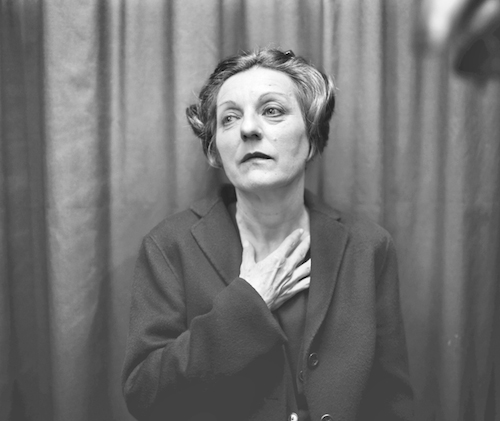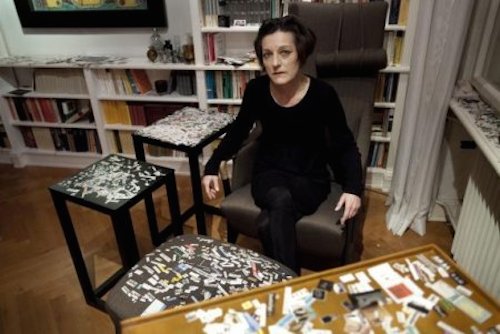Notes Toward a New Language: On Herta Müller
BY Cynthia Cruz
It is not you who will speak; let the disaster speak in you.
--Maurice Blanchot

In an interview in The Paris Review (Fall 2014) Herta Müller stated:
Back then in the factory I wrote because I had to, as a matter of self-assurance, because all doors were closed. I didn't know where to turn, didn't know how things would go, my father had died, I couldn't go back to the village, I didn't have any perspectives at all, and there was a lot of fear because the secret police were harassing me daily. It was an absurd situation—they’d kick me out of my office but I still had to work. I couldn't leave the factory, couldn't give them a pretext to dismiss me. And so I started writing, and suddenly there was this rearview mirror, and everything started coming back about my life in the village. I wasn't trying to write literature, I just put it down on paper to gain a foothold, to get a grip on my life.
Writing is a method by which one can "gain a foothold," a machine through which one might, if lucky, input one's experience and, through the machine, be saved from self-annihilation, a kind of "by-passing" machine.
In 2009, Müller was awarded the Nobel Prize in Literature. Of Müller, the jury stated, “(Müller) who, with the concentration of poetry and the frankness of prose, depicts the landscape of the dispossessed." Herta Müller, the author of poetry, novels, short stories and essays, was born in a small German-speaking village in the Romanian Banat and her work chronicles, using a poetic precision, the terror, violence, and trauma of living in communist Romania under the regime of Ceaușescu.
In her collection of essays, Cristina and Her Double, Müller writes:
Reading books or even writing them brings no relief. If I have to explain why I find one book rigorous and another shallow, I can only point to the frequency of passages that bring forth a disconnection in the head, passages that draw my thoughts straight to the places where no words exist. The more frequently these passages occur in a text, the more rigorous the book; the sparser they are, the shallower the text. For me the criterion of a text’s quality has always been: does it bring about a silent disconnection in the head(28).
The spaces in between, the silence of what cannot be explained in language—need to be respected, given space, and not covered or coated in a flurry of words.
What cannot be said needs to be connected to a space of silence which stands in for the unsayable. I have written eslewhere about these holes in the work of Marguerite Duras and have seen it, also, in the writing of Lispector and Bachmann—the hesitation, stutter, the breath of silence--used to enact the spaces of lived experiences that cannot be reduced to a simple explanation.
Müller is also a collagist. Lyn Marven, co-editor of the book Herta Müller, in her essay from the collection, “‘So freed war das Gebilde’: The Interaction between Visual and Verbal in Herta Müller’s Prose and Collages” connects Müller’s use of the collage with trauma and the collage as metaphor for trauma. She writes: “Müller’s own collages have a similar function within her oeuvre, both expressing the effects of trauma, and, as an artistic activity, seemingly enabling her to move towards the articulation of it, precisely because they preserve its effects."

The collage enacts the fracture, the breaking. And the piecing back together of the shards is a kind of practice at learning how to speak again. A person made speechless from trauma, her words shocked out of her, can begin again (to "speak") by carefully choosing her words as they are visually placed before her. This act of pasting words together one by careful one rehabilitates the speechless. This act is akin to the work done in hospitals where anorexics or chronic depressives, both groups of individuals made mute, sit around the communal table pasting collages together or beading beads onto a string. Articulation by increment.
Furthermore, cutting words out of media (magazines and newspapers) is, in a sense, cutting them from their cultural reference. Once the word is cut out of the magazine or newspaper, it is alone, free from the meaning(s) it had previously been connected with.
A collage made in this manner is like an SOS, a desperate attempt to convey a message. The words, cut out, and set down on the table become things themselves: alive, filled with meaning. Each word becomes sacred, and one can touch each one, examining it, what it holds, what it carries, its myriad of meanings. Collaging in this way is the opposite of haphazard.
Again, Marven writes: “Trauma cannot be integrated into a narrative memory and exists only as gap or blank spot; it therefore cannot be articulated or expressed directly but returns as flashbacks or unassimilable images.” The spaces between articulation, the fissures or breaks, remain as blank spots or what I call “holes” in the writing of authors whose writing is a means at expressing or conveying trauma.
Müller’s work enacts rather than attempting to explain trauma literally. Trauma, in any case, is inexplicable, it can be conveyed but its full import cannot be expressed by telling the literal story of what “happened” because the experience of what actually happened exists between the cracks of comprehension. In the end, there is no precise articulation, no exact communication. In the end, it is a constant search for the word that best fits what we mean to say.
“The words have their own truth, and that comes from how they sound. But they aren't the same as the things themselves, there’s never a perfect match,” Müller states in the Paris Review interview. Furthermore, she says, “Every object becomes steeped with meaning. But the meanings change with the experience of the viewer.”
This means, of course, that one who has not actually experienced the same trauma or a similar trauma as the writer who is attempting to convey the experience will miss this. What she will instead see are the letters on the page that explain a situation but without the glue of experience, she will see only the event, missing entirely the nuance of what the actual experience felt like. Like a parable, just writings exist as two stories as the same time. For example, when one reads such work she might recognize and appreciate the beauty of the writing but not have access to the layer beneath it, where the experience the writer is attempting to convey.
In the above interview with Claire Messud for the PEN Foundation's Festival, Müller said:
Language, itself, doesn't exist. It is only what we can do with it. It is what happens to human beings. Language does not exist without human beings. I have learned not to trust language in a dictatorship because I have learned all the things that a dictator can do with it. And language can help to kill. It can help to save. And you can do anything with language but language in itself is nothing without its relationship to humans.
In "Naming Her Worlds, Part by Part," by Larry Rohter in The New York Times, Müller explains the origin of her name:
Then there is the matter of "this awful name, Herta," she added, speaking in German through an interpreter. "I have it because one of my mother's friends in the camp was named Herta, and she died. My mother had promised that if she had a daughter, she would name the child after her friend. I learned this not from my mother, but from my grandmother when I was still very little. I did not know what a camp was then, but I was surrounded by things that had to do with the camp.
The word "Herta" is nothing but a series of five letters but the word changes, it becomes something else entirely, when a human connects those five letters with meaning. Here, the meaning is a woman who has died in a camp. That meaning is not connected to the name "Herta" when it is given to Müller as a child. Now she carries this meaning with her wherever she goes. She is now, in a sense, connected to the life of this woman, her history, and the camp.
And, yet in the end, again, words will never be able to convey exactly what happened. As Müller writes in "When We Don't Speak We Become Unbearable," from her collection of essays, Cristina and Her Double:
Real experience can never be captured one to one by words. In order to describe it, it must be cut out to suit the words and entirely reinvented. To enlarge, diminish, signify, complicate, include, omit--a tactic that has it own paths and that uses lived experience merely as a pretext. While writing, one drags lived experience into another field. One tests which word is capable of what. It's no longer day or night, village or city. Noun and verb are now in control, main clause and subordinate clause, beat and sound, line and rhythm. What really happened persists as a side issue, through words one gives it one shock after another. When it no longer recognises itself, it's back in the middle. To write about it one has to demolish the grandiosity of lived experience, leave that real street and turn into an invented one, for only the invented one can resemble the real one again.
Cynthia Cruz is a poet, novelist, and nonfiction writer. She is the author of the poetry collections...
Read Full Biography

